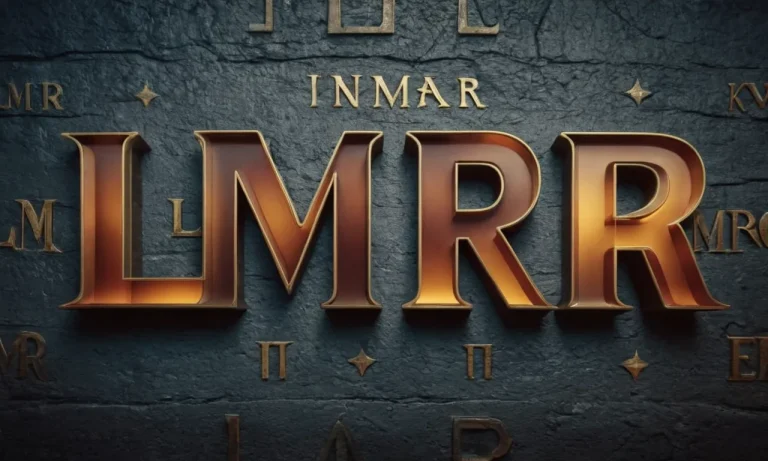How To Easily Memorize The Books Of The Bible
Struggling to remember all 66 books of the Bible? You’re not alone! Memorizing the books of the Bible in order can be a tricky task. But having this knowledge under your belt is helpful for Bible studies, church, or even general religious trivia.
If you’re short on time, here’s the quick answer to memorizing the books of the Bible: Use memory techniques like acronyms, songs, visualizations, and repetition. But diving deeper, this in-depth guide will walk through various effective strategies to memorize all the books in order and quiz yourself along the way.
In this comprehensive 3000 word guide, you’ll discover the top tips and tricks to memorizing the books of the Old Testament and New Testament. We’ll cover using mnemonic devices, setting up memorization schedules, making flashcards, and reviewing with practice quizzes.
With the right techniques, anyone can master listing the books of the Bible in order!
Understanding the Categories of Bible Books
The Old Testament contains 39 books written between approximately 1400 BC and 400 BC. These books are divided into four main categories: the Pentateuch, the Historical Books, the Poetic and Wisdom Books, and the Prophetic Books.
The Pentateuch comprises the first five books of the Bible – Genesis, Exodus, Leviticus, Numbers, and Deuteronomy. These books were written by Moses and tell the story of creation, the fall of man, the covenants, and the early history of the Israelites.
The Historical Books include Joshua through Esther. These 12 books cover the conquest of Canaan, the time of the Judges, the united monarchy under Saul, David, and Solomon, the divided kingdom, and the exile and return from Babylon.
Key figures include Joshua, Gideon, Samson, Ruth, Samuel, Saul, David, Solomon, and Esther.
The Poetic and Wisdom Books include Job, Psalms, Proverbs, Ecclesiastes, and Song of Songs. These books contain poetry, wise sayings, meditations on the meaning of life, and love songs. King David is identified as the author of many of the Psalms.
The Prophetic Books are divided into the Major and Minor Prophets. The Major Prophets are Isaiah, Jeremiah, Lamentations, Ezekiel, and Daniel. The Minor Prophets are Hosea through Malachi. These books call God’s people to repentance and faithfulness through prophetic messages, warnings, and visions of the future.
The New Testament
The New Testament contains 27 books written between approximately AD 45 and 100. It can be divided into four sections: the Gospels, the Acts of the Apostles, the Epistles, and Revelation.
The four Gospels – Matthew, Mark, Luke and John – tell the story of Jesus’ life, death, and resurrection. Jesus’ teachings, miracles, encounters, death by crucifixion, and resurrection form the basis for the Christian faith.
Acts tells the story of the early Christian church and the spread of the gospel after Jesus’ ascension into heaven. Key figures in Acts include Peter, John, Stephen, Paul, Barnabas, Timothy, Silas, and Luke.
The Epistles are letters written by Christian leaders to instruct, encourage, and correct early believers. There are 21 Epistles total – 13 attributed to Paul, three to John, two to Peter, and one each to James, Jude, and the writer of Hebrews.
Revelation depicts prophetic visions seen by the apostle John on the island of Patmos. The apocalyptic imagery points ahead to God’s ultimate triumph over evil and the coming of the new heaven and new earth.
Creating Mnemonic Devices and Acronyms
Mnemonic Devices for the Old Testament
Mnemonic devices can be incredibly helpful when trying to memorize the books of the Old Testament. Here are some fun and memorable ones:
- Genesis, Exodus, Leviticus, Numbers, Deuteronomy (Spell out the Pentateuch books)
- “Guys Eat Lunch Near Dan’s Place” (Genesis, Exodus, Leviticus, Numbers, Deuteronomy)
- “Grandpas Eat Leftover Nachos During Parties” (Genesis, Exodus, Leviticus, Numbers, Deuteronomy)
You can come up with any phrase or sentence that helps you remember the order of the first five books. After the Pentateuch, a common mnemonic is:
- “Joshua Judges Ruth, First and Second Samuel, First and Second Kings, First and Second Chronicles, Ezra, Nehemiah, Esther” (Say it in a sing-song way)
You’ve now covered the historical books. For the poetic books, remember “Job, Psalms, Proverbs, Ecclesiastes, Song of Solomon.”
The Major Prophets can be remembered as “Isaiah, Jeremiah, Lamentations, Ezekiel, Daniel.”
And the Minor Prophets as “Hosea, Joel, Amos, Obadiah, Jonah, Micah, Nahum, Habakkuk, Zephaniah, Haggai, Zechariah, Malachi.” Try making up a song or phrase to help with the Minor Prophets!
Mnemonic Devices for the New Testament
For the New Testament, start with the Gospels: “Matthew, Mark, Luke and John.” Easy enough!
The next books can be remembered as “Acts, Romans, First and Second Corinthians, Galatians, Ephesians, Philippians, Colossians, First and Second Thessalonians.” Say it rhythmically for better recall.
The next part goes: “First and Second Timothy, Titus, Philemon, Hebrews, James.”
Then: “First and Second Peter, First, Second and Third John, Jude.”
And finally: “Revelation.”
Coming up with your own acronyms or clever sayings for the New Testament books can help cement them in your memory.
Acronyms
Acronyms condense the books of the Bible into a short memorable phrase. Here are some examples:
- Old Testament: “Great Job Ezra, David Chronicles Good Stories, Isaiah Wrote Journals & Poems”
- New Testament: “Many Miracles Luke Penned, Apostles’ Acts Recounted, Jesus’ Early Life”
Feel free to create your own acronyms! They are a great way to memorize all 66 books of the Bible.
Using mnemonic devices and acronyms can make memorizing the books of the Bible so much easier. Find techniques that work for you. With a bit of effort, you’ll have all 66 books committed to memory in no time!
Setting a Memorization Schedule
Memorizing the books of the Bible can seem like a daunting task, but setting a structured schedule can make it much more manageable. Here are some tips for planning out your Bible book memorization schedule:
Set Reasonable Daily Goals
Don’t try to memorize too many books at once. Aim to memorize just 2-4 books per day. Going over just a handful each day is more sustainable long-term than cramming.
Focus on One Section of the Bible at a Time
Tackle one section of the Bible before moving onto the next. For example, start with just the Pentateuch (first five books), then move to the historical books, then poetic books, Major Prophets, Minor Prophets, Gospels and so on. This makes the task less overwhelming.
Quiz Yourself Throughout the Day
After memorizing a section of books, quiz yourself on them several times throughout the day. Memory experts recommend reviewing new information after 20 minutes, 1 hour, 5 hours and 24 hours for best memorization.
Find Accountability Partners
Ask friends or family members to quiz you or have contests to name Bible books. Accountability can motivate you to stick with your memorization goals.
Use Memorization Aids
Songs, apps and mnemonic devices can all help boost memorization. For example, a catchy song like “My Grandfather’s Clock” can help memorize the 12 Minor Prophets in order. Find aids that work for you.
Be patient with yourself and stick to your schedule as much as possible. Before you know it, you’ll have all 66 Bible books committed to memory through consistent daily practice!
Using Flashcards and Games
DIY Flashcards
Making your own flashcards is a great way to memorize the books of the Bible. Here are some tips for making effective DIY flashcards:
Making your own cards takes more effort up front, but the process of creating them is great for learning. You can also make them as fun and creative as you want!
Flashcard Apps and Websites
If you don’t have time to make physical flashcards, check out digital flashcard apps and websites. Many have pre-made Bible book decks you can download.
Popular free options include Anki, Quizlet, and StudyStack. Paid options like Brainscape offer more features. Apps allow you to quiz yourself and track progress on your phone or tablet. Websites can be used on any device with a browser.
The pre-made Bible book decks on these platforms provide an instant flashcard resource. Many also allow you to create your own decks if you want to customize them.
Bible Book Games
Turning memorization into a game makes the process more engaging and enjoyable. Here are some fun game ideas:
Get creative and try inventing your own Bible book games too. Playing with family and friends makes it even more fun. Approaching memorization as a game takes the dread out of the task.
Quizzing Yourself
Self-Testing Strategies
One of the most effective ways to memorize the books of the Bible is by quizzing yourself. Self-testing allows you to actively recall the books, which strengthens your memory. Here are some great self-testing strategies:
- Flashcards – Write each book name on a separate flashcard. Go through the cards and practice recalling the order. Shuffle the cards each time to keep yourself on your toes!
- Apps – Download a Bible books quiz app on your phone or tablet. These apps give you the flexibility to test yourself anytime, anywhere.
- Write them – Grab a sheet of paper and try writing down all 66 books from memory. Check how you did, then rewrite the ones you missed until you can get them all.
- Verbal recital – Verbally recite the books out loud from Genesis to Revelation. Recording yourself can help identify areas you need to improve.
- Test sections – Quiz yourself on smaller sections at a time. Try memorizing just the Pentateuch, then move on to the history books, poetry books, Major and Minor Prophets, etc.
The key is active recall – the more you force yourself to remember the books without aids, the quicker you’ll commit them to memory. Start testing yourself today!
Reciting with a Partner
In addition to quizzing yourself, you can also team up with a partner, friend or family member to help drill the books. Here are some engaging ways to practice reciting the Bible books with someone else:
- Take turns – Go back and forth reciting the next book. Give each other clues if needed. See how far you can go without missing one!
- Speed round – Set a timer for 1 minute. Take turns reciting as many books as you can in that time. Try to beat each other’s records.
- Buzzer game – Designate objects as “buzzers.” Recite the books alternating turns. If you get stuck, the other person can “buzz in” and pick up where you left off.
- Out of order – For an added challenge, take turns reciting the books randomly. Call out “Acts!” and your partner must respond with the next book “Romans.”
Having a partner keeps sessions fun and engaging. You can motivate each other to keep practicing. Bonus points if you record your attempts and try to beat your best time or high score!
Conclusion
With consistent practice using these memorization tactics, you can confidently learn the books of the Bible in order. Start by familiarizing yourself with the different categories and divisions. Then begin employing mnemonics, flashcards, reciting, and self-quizzing.
Setting a schedule will help you dedicate time to review the books. Before you know it, you’ll have all 66 books memorized and be able to recite them effortlessly. Knowing the books of the Bible provides a strong biblical literacy to enhance your spiritual journey.








